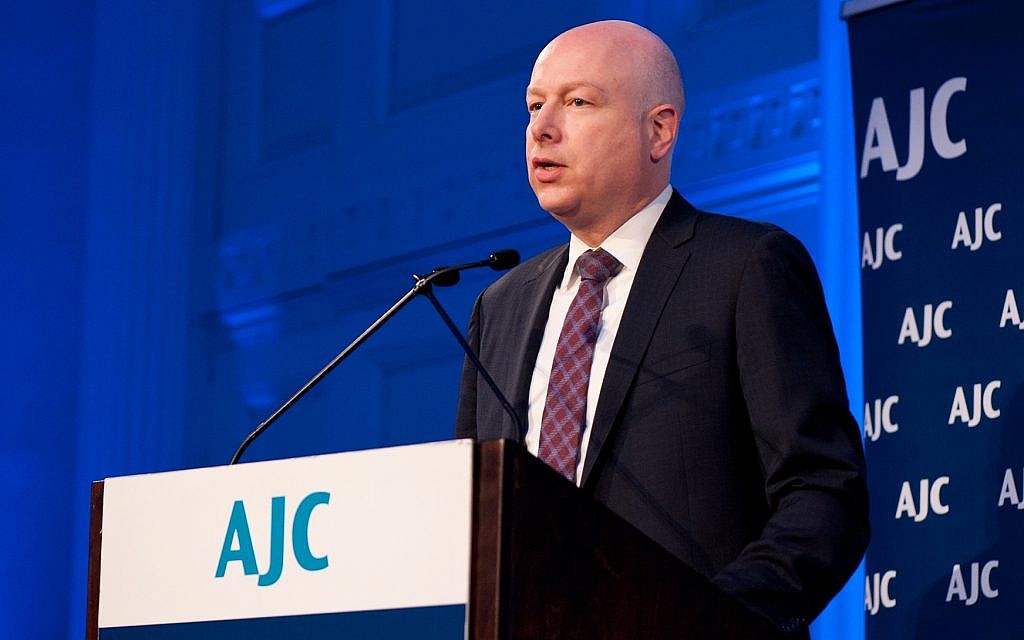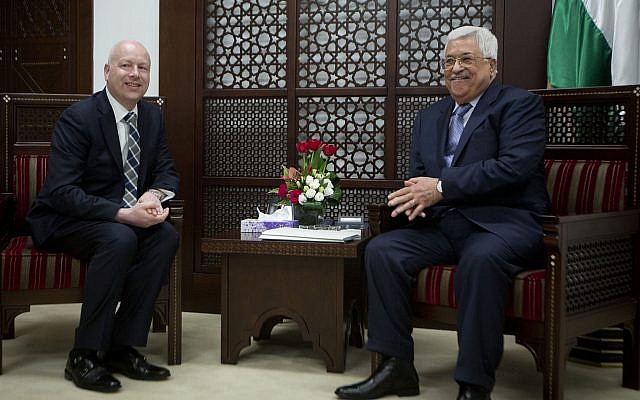What does it mean for the architect of Trump’s peace proposal to announce his resignation just weeks before its endlessly hyped release

US President Donald Trump’s Mideast envoy Jason Greenblatt addresses the American Jewish Committee’s Women’s Leadership Board Spring Luncheon in New York on April 24, 2018. (Courtesy / Ellen Dubin Photography)
WASHINGTON — Perhaps the strangest thing was the timing.
Jason Greenblatt’s announcement on Thursday of his resignation as US President Donald Trump’s Mideast peace envoy came just a few weeks before the administration’s declared target date for the release of its long-awaited peace plan.
The White House, which has pushed back the publication of its proposal multiple times, has been on record for months that it will finally unveil its contents shortly after Israel’s September 17 election.
Expectations for the plan’s success — at least in terms of its ability to facilitate an agreement between the parties — have been uniformly low, but veterans of Israeli-Palestinian diplomacy said Greenblatt’s move suggests that Trump’s team itself lacks confidence in it.
“You have an architect of the so-called ‘ultimate deal,’ the guy who’s done most of the work, and all of the sudden they announce that he’s leaving days, if not weeks, before this plan is going to be put on the table?” exclaimed Aaron David Miller, a former peace negotiator in both Democratic and Republican administrations.
“You pull out a core member, perhaps the core member at the working level — it speaks to the absence of seriousness and credibility,” Miller told The Times of Israel. “The smarter move would have been to create a decent interlude between the rollout of this plan, assuming they are going to roll it out, and Greenblatt’s departure. What does this say about their confidence and hopes for implementation?”
Yet the Trump White House’s approach to the Israeli-Palestinian file has been defined by an eagerness to defy the norms and conventions set forth by previous administrations.
From moving the US embassy to Jerusalem, slashing aid to the Palestinian Authority, and closing the PLO Washington office, the president’s team has often been accused of acting as if it were part of Prime Minister Benjamin Netanyahu’s staff rather than being a third-party peace maker.
Greenblatt, an Orthodox Jew, has been at the center of that dynamic.
Vocal defender
Through his social media presence, Greenblatt — who is officially said to be quitting “to return to New Jersey to be with his wife and six children,” and who will remain available immediately after the plan is rolled out — has been a vocal defender of Israel and the Netanyahu government, and a scathing critic of the Palestinians.
Many times, he seemed to be regurgitating official Israeli talking points.
Last month, for instance, he tweeted about the US blocking a UN Security Council resolution condemning Israel’s demolition of Palestinian homes.
“Classic anti-Israel bias at the UN: UNSC members wanted to condemn Israel for demolishing buildings — that Israel deems are a security risk to its citizens — but can’t even condemn Hamas, or the PA’s ‘pay to slay’ program to reward terrorists,” Greenblatt said.
U.S. blocks U.N. rebuke of Israeli demolition of Palestinian homes…
“I think at the beginning Jason Greenblatt actually got a lot of points because he made the effort to spend time not only with Israelis but Palestinians of many different backgrounds,” said Susie Gelman, board chair of the Israel Policy Forum, an advocacy group that supports a two-state solution. “I think that inspired people to think he was really doing a deep dive and trying to understand the conflict at both the human level and the diplomatic level.”
Indeed, at the outset of the Trump administration, Greenblatt met with scores of Israeli and Palestinian civic, religious, and political leaders, NGOs and other activists — all as part of the early process of what the White House said was its efforts to craft a workable peace plan.
In March 2017, he met with Palestinian Authority President Mahmoud Abbas in Ramallah, which set the conditions for the Palestinian leader’s meeting with Trump at the White House months later.

But any appearance of impartiality the Trump administration wanted to convey was lost in December 2017, when it recognized Jerusalem as Israel’s capital and announced its plans to move the embassy there.
Afterwards, relations were never the same. Palestinian leaders refused to meet with Washington officials, and Trump responded with a series of aid cuts. Now, the prospect of direct peace negotiations between the sides appears more elusive than ever.
Greenblatt, meanwhile, became more bellicose toward the Palestinians, often getting into Twitter battles with Saeb Erekat, the Palestinians’ chief negotiator.
Greenblatt wrote op-eds castigating him, like he did for CNN’s website when the PA refused to attend the administration’s Bahrain workshop on the economic component of its peace proposal.
Gelman suggested that despite a promising start, Greenblatt was no longer seen as an honest broker.
“His Twitter account is full of anti-Palestinian comments all the time,” Gelman told The Times of Israel. “As the three years have evolved, I think that the promise of his genuine effort to get to know both sides on the conflict on a personal basis dissipated. He’s not been seen to be evenhanded on this.”
Silent on the substance

In fact, Miller — who admitted that Greenblatt was working “within very serious constraints,” given the inclinations of his boss — argued that he was part of the administration’s efforts to fundamentally shift the nature of how the United States treats the conflict.
“My sense is this is an effort to reframe the American approach to the Israeli-Palestinian negotiations,” he said. “They were interested in creating a new foundation for the whole basis of what it means to have an Israeli-Palestinian negotiation and an outcome.”
For instance, Greenblatt, along with Kushner, was a core Trump official who pushed for the “outside-in” approach of involving Arab regional actors to impose a formula on the Palestinians, and who advocated for discarding the term “two-state solution.” The rationale, they said, was that the term meant different things to different people.
When asked what alternative the administration would push for instead, Greenblatt was reliably disciplined — often telling reporters, including this one, that the plan would speak for itself when it was released at the appropriate time.
“He has maintained a degree of radio silence on the substance of their approach,” said Miller, “which makes it virtually impossible to make judgments on the core substance of what this plan is, and what he spent the last three years of his life working on.”




Aaron David Miller’s opinion is as worthless as John Kerry’s in relation to Israel. Greenblatt was ready to leave for months and with the release rescheduled numerous times, decided not to wait longer.
Greenblatt’s job has been completed and his presence is no longer required now that the plan has been formulated. He is undoubtedly persona non grata to the Palestinians and therefore his absence gives someone else the opportunity to push the Palestinians in a New Direction. Plan execution is all that is required next or its failure which seems to be most probable unless the economic interests of the Palestinians step forward is personalities and we have the good luck to bury Abul Abbas which is highly probable. I predict Abbas will die on a Jewish holiday, hahaha.
The Next Step will be to pit the economic interests of the Palestinians and the personalities who represent them against Abbbas’ successors. That mad scramble should lock the next US president in to the plan, otherwise we will be picking the loosers.
Undoubtedly the Iranians will push Hezbollah and Hamas to push the Palestinian Authority to postpone the effects of the plan in an effort to unseat Jewish support for Trump ala the Jimmy Carter affair.
Apparently Kushner thinks that Avi can follow his instructions and Kushner takes the spotlight and credit for lawyer Greenblatt’s efforts. Maybe Kushner will be Trump’s next VP .
The mandate that should include eastern Israel as a province with serious attention by u k to correct its miss handling and of its terror support to allow all the illegal arab families entry into u k from Israel, the u n needs to give israel an equivalent amount of financial €£$ that they give to support terror for enlarged pensions to the jewish/Israely elderly and www2 survivors. Peres and Rabin and sharon need to be officially condemned and their names removed from all public palaces.